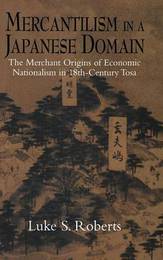
|
Mercantilism in a Japanese Domain: The Merchant Origins of Economic Nationalism in 18th-Century Tosa
Hardback
Main Details
| Title |
Mercantilism in a Japanese Domain: The Merchant Origins of Economic Nationalism in 18th-Century Tosa
|
| Authors and Contributors |
By (author) Luke S. Roberts
|
| Physical Properties |
| Format:Hardback | | Pages:268 | | Dimensions(mm): Height 229,Width 152 |
|
| Category/Genre | Economic history |
|---|
| ISBN/Barcode |
9780521621311
|
| Classifications | Dewey:330.952 |
|---|
| Audience | | Professional & Vocational | |
|---|
| Illustrations |
6 Tables, unspecified; 9 Line drawings, unspecified
|
|
Publishing Details |
| Publisher |
Cambridge University Press
|
| Imprint |
Cambridge University Press
|
| Publication Date |
28 September 1998 |
| Publication Country |
United Kingdom
|
Description
This book explores the historical roots of economic nationalism within Japan. In a situation analogous to early modern Germany, Japan in the Edo period (1600-1867) was divided into over 230 realms, many of which developed into competitive states that struggled to reduce the dominance of the shogun's economy. This study of the merchants of one such domain, Tosa, reveals how they developed mercantilist strategies to protect and invigorate their domain's economy, and to support the public value of the merchant in a hostile Confucian world.
Reviews"This book greatly contributes toward an improved analysis and understanding of the real socio-economic conditions of later Tokugawa Japan, the polity of which differed from that of China and Korea. It clarifies the non-Confucian characteristics of economic thought, revealing the comparability between Japan and European countries. Anyone interested in economic nationalism could learn much from this definitive and brilliant work." Teiichiro Fujita, Doshisha University, Kyoto "This book presents a very attractive description of the historical roots of economic nationalism, and is also the most original and comprehensive description of the petition box in Japan that I have ever read. I believe this book will have a big influence on the research of Japanese scholars in the fields of the political, economic and legal history of premodern Japan." Yuichi Ohira, Ritsumeikan University "Drawing on a conception of the Tokugawa political economy as a "multi-state'system, Luke Roberts investigates the origins of the mercantilist notion of production and export for "the profit of the country" (kokueki) that pervaded many domains of Tokugawa Japan by the early nineteenth century. Focusing on the important and perhaps pivotal domain of Tosa, he shows that mercantilist ideas originated not with samurai policy after the mid-eighteenth century as Japanese scholars have consistently argued, but in "bottom-up" initiatives from the merchant class that began decades earlier. These original and persuasive arguments are woven lucidly into a larger picture that both synthesizes and epitomizes the best of a new wave of innovative scholarship on the political and economic history of Japan from Tokugawa to Meiji." Henry D. Smith,II, Columbia University "Luke Roberts' research is at the cutting edge of scholarship on Tokugawa Japan. His analysis of the formation of economic policy in an eighteenth-century domain has important consequences for consideration of class dynamics, political consciousness, and proto-nationalism in early modern Japan." Marius Jansen, Princeton University "This book traces the relationship between the polity and the economy in Tokugawa Japan by focusing on Tosa, a large domain on the island of Shikoku fronting the Pacific Ocean. It demonstrates that the rhetoric of national prosperity, as well as specific proposals for implementing it, were the result of bottom-up initiatives more than top-down directive. This restoring the commoner voice to debates on economic and political policy is an important contribution to our understanding of early modern Japan and a highly significant achievement." Anne Walthall, University of California at Irvine "In particular, this book sees an important mechanism of communication in the petition box, an institution that has been completely ignored in English-language scholarship and often slighted in Japanese. its analysis of the role it played, not just in Tosa, but across Japan, is going to force scholars fundamentally to reevaluate their understanding of the relationship between commoners and rulers in early modern Japan, particularly in terms of the rulers' willingness to listen to commoner voices." Anne Walthall, University of California at Irvine "...Roberts has produced a wonderfully stimulating piece of research and analysis that will prove of interest and significance to economic, political, social, and intellectual historians of Japan for decades to come." Peter Nosco, American Historical Review "This stufy of the Tosa domain in the eighteenth century is a model of detailed research in the archival materials of the period backed by wide reading in the secondary sources." Pacific Affairs "[Roberts'] thorough and original research...should provoke wide discussion of such critical issues as early modern economic change, nationalism, and state-society relations." Brian Platt, The Historian "This is a significant work that raises hypotheses worthy of further exploration in other regional contexts." Philip C. Brown, Journal of Japanese Studies
|